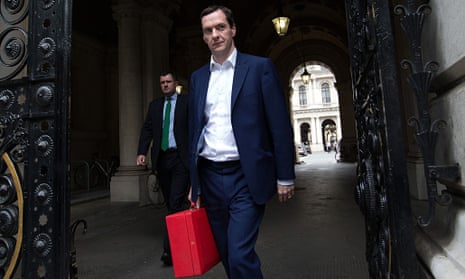How do you take £12bn out of the pockets of millions of “hard-working families”, a fair proportion of whom are already struggling to keep their heads above water financially? We are set to find out on Wednesday when George Osborne stands up to deliver his second budget in less than four months.
The government is planning £12bn in welfare cuts, and there is growing speculation that much of that will be achieved by mounting a smash-and-grab raid on child tax credits, plus housing benefit and possibly some disability benefits.
Any changes to the multibillion-pound tax credits system, originally introduced by Gordon Brown and aimed at topping up the incomes of those raising families and those in work but with low wages, will be deeply contentious, however well anticipated they may be.
How do tax credits work? There are two sorts: child tax credit and working tax credit. Both are separate to child benefit payments.
Child tax credits are for those on a low income raising children. The amount you receive depends on how many children you have and how much your annual income is. You can generally get child tax credit for each child you are responsible for if they are under 16 or under 20 and in approved education or training. You don’t need to be working to claim child tax credit.
Working tax credits, meanwhile, are a top-up for low earners who typically need to be working a minimum number of hours a week to qualify. You can generally get working tax credit if you are aged from 16-24 and have a child or a qualifying disability, or are 25 or over, with or without children. You can also apply if you are on leave or about to start a new job.
Who benefits from them? The main carer of children in a family will be paid child tax credits. As a rough guide, HMRC says this would apply to someone with one child in a household with an income of up to £26,100, or with two children with a household income of up to £32,900.
Working tax credit is based on the number of hours a claimant works. Everyone who qualifies receives a basic element, which can be worth up to £1,960 a year depending on income.
How many people claim them, and how much do they cost? Around 4.5 million people claim tax credits. It has been estimated that around £30bn in tax credit cash is paid out each year.
The entire welfare budget comes to £220bn, which includes unemployment benefits and the state pension, so tax credits are almost 14% of the total.
What is expected from the budget? It is widely thought that the £12bn in cuts will include a reduction in tax credits. In a recent speech David Cameron said he wanted to end the “ridiculous merry-go-round” of taxing low earners, “and then the government giving them that money back – and more – in welfare”. The government has also said the welfare bill has to be reduced as part of a plan to get rid of the £90bn deficit by 2018.
Reports suggest that Osborne’s political allies have focused on plans debated by the Institute for Fiscal Studies to return child tax credit to its 2003-04 level, which would save about £5bn. This would reduce entitlements for about 3.7 million low-income families with children by an average of £1,400 a year. “For the poorest families it would mean a takeaway of £845 per child per year,” the IFS says.
What is the justification for the cuts? To those opposed to the concept of tax credits they are a handout. It is also fair to say that the tax credits system has long come under fire for being difficult for claimants to understand, equally challenging for HMRC to administer, and vulnerable to fraud and errors.
Allies of Osborne have said reduced tax credits would increase the incentives for people to work. Iain Duncan Smith, the work and pensions secretary, says: “We want companies to pay better salaries, which means less tax credits from us.”
What do those opposed to cuts say? Labour leadership front runner Andy Burnham has said he would oppose attempts to reduce tax credits for those on low incomes. Osborne has also faced opposition from some of his own colleagues.
The Fabian Society, meanwhile, has said that cuts to tax credits would lead to higher child poverty. And Alison Garnham of the Child Poverty Action Group says: “No serious plan for the low-paid begins with making them poorer by cutting their tax credits.”
Opposition has also come from business groups who have said firms cannot be expected to increase wages to compensate for cuts in tax credits. Labour has said there would need to be a 25% across-the-board rise in the minimum wage to compensate the lowest-paid workers if the government was to cut tax credits by £5bn.
Steve Hilton, Cameron’s former adviser, claimed in a recent Daily Mail article that it was a “complete travesty” that giant retailers such as Tesco and Sainsbury’s were making billions of pounds in profits while they are “subsidised by the taxpayer so they can pay their workers a pittance”.

Comments (…)
Sign in or create your Guardian account to join the discussion